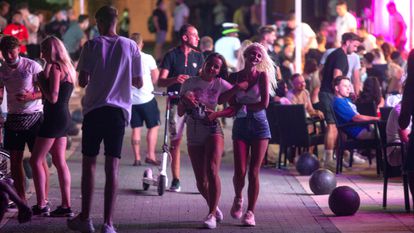Spanish health authorities warn about ‘acute’ Covid-19 cases among youths
According to the latest figures, 1,525 coronavirus infections were detected in the last 24 hours
/cloudfront-eu-central-1.images.arcpublishing.com/prisa/TZPOHZKBJVFM3IL2JIIN5KIDRY.jpg)

Spanish health authorities warned on Thursday that some young people are being admitted into intensive care with “acute cases” of Covid-19, and not just older patients as seen during the peak of the crisis in March and April.
The warning was issued by Fernando Simón, the director of the Health Ministry’s Coordination Center for Health Alerts, who called on Spain’s youth to take “care” and properly assess the risks they are facing. Social interaction by young people, who are seen as “less careful” about protecting themselves, has become one of the sources of the new surge in coronavirus cases, and some regional governments have closed nightlife venues in a bid to curb contagion.
MORE TRAVEL RESTRICTIONS
Germany has now included Catalonia, Aragón and Navarre on its list of risk zones, and Slovenia is imposing a quarantine on travelers from Valencia, Catalonia, Basque Country, Aragón and Navarre.
The average age of the coronavirus cases detected in Spain has fallen to 45 for men and 41 for women. But if only the data from the last three weeks is taken into account, the figure is even lower: 36 and 38, respectively, explained Simón at a government press conference. In March and April, the average age of coronavirus patients was more than 60. Widespread screening, which was not available earlier this year, has been partly credited for the change.
The news comes as Spain reported another increase in daily Covid-19 infections. According to the latest data presented on Friday, 1,525 new coronavirus cases were detected in the previous 24 hours. This is more than the 1,229 reported on Thursday and the highest figure since the end of the coronavirus lockdown in Spain.
But there is little in common between the current situation in Spain and the confinement period. Spain’s diagnostic capacity has greatly improved since then, and many more cases are being detected through early screening and contact tracing. According to Simón, 60% of infections are asymptomatic at the moment of detection. Some may experience symptoms later, but at that point they are isolated and cannot spread the infection, he said.
Aragón, Madrid and Catalonia continue to record the highest number of new Covid-19 cases, with 352, 225 and 121 infections, respectively. Despite the rise in cases, Simón denied that Spain was seeing a second wave of the virus, which is defined as uncontrolled community transmission in a wide area. “Neither in Spain nor in most of Europe is this situation happening,” he said.
Lower fatality rate
The case fatality rate of the coronavirus in Spain has fallen to below 2%, down from the 11-12% recorded in March and April. This is due to the fact that more cases are being detected, and that most infections are among young people with no prior health problems. The case fatality rate – which represents the number of deaths per diagnosed cases – fell to 0.6% between June 18 and July 1, and to 0.4% between July 2 and July 15.

“Groups are much less vulnerable, but we are detecting a lot more cases,” explained Simón.
In the last week, 209 health workers were diagnosed with Covid-19. Of this figure, 57 had begun to experience symptoms, meaning 75% were asymptomatic. Since the beginning of the pandemic, a total of 53,186 coronavirus cases have been recorded among health workers, 2,766 since May 11.
More active outbreaks
According to Simón, a total of 483 coronavirus outbreaks are active in Spain, with 5,700 associated cases. This is 71 more than the figure stated by Health Minister Salvador Illa at a congressional appearance on Thursday morning.
Simón explained that 75% of the outbreaks involve fewer than 10 cases. The rest “are those which have a high risk of leading to community transmission,” he said. Most of the outbreaks are occurring in social settings. This covers contagion among family members, which has led to 90 outbreaks with 770 cases, as well as transmission at bars and other social venues, which are connected to 30 outbreaks and 1,100 cases.
Health Minister Illa explained that seasonal workers, family reunions and nighttime activities, especially among young people who are “less careful” with the preventive measures, had caused the largest Covid-19 outbreaks.
Simón added that the arrival of tourists to Spain presented a “risk” to the spread of the Covid-19, but also apologised for the statements he made last Monday with respect to the restrictions placed on travel to Spain.
On Saturday, the United Kingdom reintroduced a 14-day quarantine for travelers from Spain, and on Monday night, the British government advised against all non-essential travel to Spain, including the Balearic and Canary islands. Norway has taken similar measures.
In response to questions on the issue, Simón said: “From a health point of view, these decisions help us, and it is a risk that we are spared.”
English version by Melissa Kitson.
/cloudfront-eu-central-1.images.arcpublishing.com/prisa/MNK5WFHPZVAXJJRHAPQQJWLJ4U.jpg)
/cloudfront-eu-central-1.images.arcpublishing.com/prisa/M733G6PESFCSHNAQQIG2JDHDV4.jpg)










































